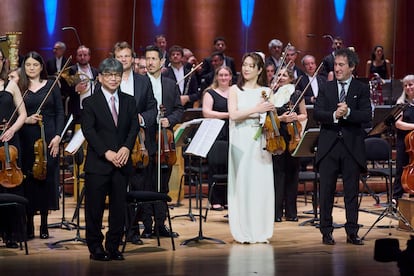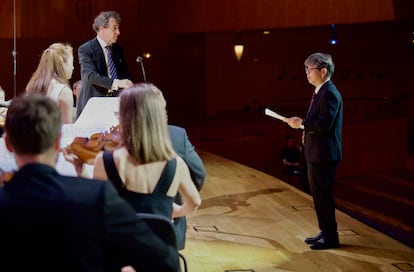Toshio Hosokawa: “My music combats the superficial Japanese exoticism of Puccini's 'Madama Butterfly'”

Toshio Hosokawa was born in Hiroshima exactly ten years, two months, and seventeen days after the most terrible episode in its history. However, the destruction of the Japanese coastal city by an atomic bomb dropped from the American bomber Enola Gay did not mark his childhood, although the radiation killed two of his uncles. The Japanese composer grew up in an environment marked by silence in the face of the memory of the tragedy. He trained in Germany from 1976, where he was able to contemplate its culture from a distance and learn the avant-garde techniques of Western music. After returning to Japan, in 1989 he wrote his first major work: Hiroshima Requiem , an intense oratorio that he revised and expanded in 2000 as a sound memorial to give voice to those who no longer have one, with the new title Voiceless Voice in Hiroshima .
The Japanese composer has received the seventeenth Frontiers of Knowledge Award in Bilbao for Music and Opera , awarded by the BBVA Foundation. According to the jury, he is "one of the most original and acclaimed creators of our time" with an "extraordinary scope in his music, a bridge between Japanese tradition and contemporary Western aesthetics." This was evident last Wednesday, June 18, at the tribute concert for the winners offered by the Basque Country Symphony Orchestra under the direction of Fabián Panisello . The program highlighted the 2020 Violin Concerto "Genesis" from his extensive catalog of almost two hundred compositions as an ideal fusion of Western modernist tradition and Japanese sensibility, with the participation of his compatriot Akiko Suwanai as soloist.
Hosokawa welcomed EL PAÍS to the Euskalduna Palace after the dress rehearsal for the concert. The interview, conducted in Japanese with the help of a translator, began with a heartfelt declaration of humility upon seeing his name alongside those of John Adams , Arvo Pärt , Peter Eötvös , Philip Glass , Thomas Adès , and George Benjamin : "This award is too much for someone like me," he exclaimed, clasping his hands. He concluded by revealing details of his new opera, Natasha , whose world premiere will be in August at the New National Theatre in Tokyo . However, in the interview, the composer explains in detail how he has built this bridge between Japanese tradition and contemporary European aesthetics, thus combating the superficial exoticism with which Japanese music has always been treated in the West.
Question: You grew up in Japan in the context of post-World War II modernization and Westernization, where traditional Japanese music was marginalized.
Answer: Yes, when I was a child, I thought traditional Japanese music was boring and insipid. I had a deep admiration for European culture and the music of Beethoven, Mozart, Schubert, Stravinsky, Bartók, and Debussy.
Q. Is that why you traveled to Europe to train as a composer?
A. That's right. I went to Germany in the late 1970s. Then I encountered a wave of European composers who were beginning to draw on the influence of other cultures, like African and Indonesian. That made me revisit my own Japanese roots from a distance.
P. It was a round trip.
A. Indeed. Thanks to my training in Europe, I was able to hear the music of my Japanese roots again with different ears.
Q. But the use of other cultures in Western music had always been an exotic element.
A. My music precisely combats the superficial Japanese exoticism of the West. For example, in Puccini's Madama Butterfly , there is no deep understanding of Japan. My compositions show the depth of Japanese musical traditions.

Q. Are you referring to the use of dichotomies such as “sound-silence” or “light-darkness”?
A: Yes, I use dichotomies in my work as part of my roots. It's what we in the East call yin and yang. In the West, these dichotomies can be interpreted as contrary or exclusive. In the East, we have a different perception, and opposites come together to form a single, complementary entity. That's the idea I want to represent in my music.
Q. Another element that surprises when listening to your compositions is the vertical conception of time.
A. Of course, because in the West, the conception of time is horizontal. You can see this in the music of Bach or Bruckner, with those linear, architectural constructions of sound that allow us to see beyond. But in the East, we have a vertical conception, where sound is part of an infinite loop in which we don't see beyond.
Q. Could you give an example, even if it's not musical?
A. Of course. We Japanese love cherry blossoms, but the most beautiful moment isn't at the height of bloom, as it would be for Westerners, but rather when the flowers begin to wither and the petals fall from the tree branches. In Eastern aesthetics, we're not interested in the afterlife, but rather in delving into the beauty of the specific moment.
Q. How are these ideas reflected in your Violin Concerto “Genesis” (2020), which was performed in Bilbao and is dedicated to the violinist Veronika Eberle and the birth of her son Maxim?
A. The work is a musical meditation on birth, life, and the relationship between the individual and the universe. The dichotomy between soloist and orchestra is not presented as opposites; rather, the solo violin represents the human being or new life, while the orchestra embodies the nature and cosmos surrounding that life. The work represents various moments, such as the happiness within the mother's womb, the difficult moment of childbirth, or a moment at the end when the birds sing, a moment of happiness.
Q. I found it very interesting to listen to your work with the score, as the violin effectively imitates the orchestra at first, like children imitate their surroundings; then it has solo moments where it forges its individuality, and in the end, it finds its happy complementarity with the orchestra. How do you see the future of composition?
A. For me, composing is basically about searching for and finding the deep voice within us. We now live in a world of immediacy, where we use artificial intelligence to get immediate answers. But composition is the opposite. It's the process of searching for that inner voice. And as long as there are people who search and want to listen to that inner voice, composition will continue to have a future.

Q. In addition to composing numerous chamber and orchestral works, you've also written several operas that adapt elements of Noh theatre . During your recent residency in Valencia, we were able to see a semi-staged version of your 2017 opera, Futari Shizuka . I believe your next premiere will be another opera, titled Natasha , in August. How do you project your ideas into a genre as Western as opera?
A. My new opera, Natasha, aims to capture the sea of sound, both words and music, that constitutes the soul of people. It's what in psychology we might call the collective unconscious, and in the Buddhist world, the alaya . The opera tells the story of two protagonists, Natasha and Arato, who have been forced to emigrate and are forced into a pilgrimage through the hells created by the modern world: pollution, war, floods, fires, and vice. And each hell has its own sound and music. There's a sea of plastics, where I use the sound of hitting plastic, and in the world of vice, I've added rock rhythms. Complementary dichotomies reappear, and the subject is explored in depth at various moments, although, unlike other operas, I don't use traditional Japanese instruments here.
EL PAÍS




